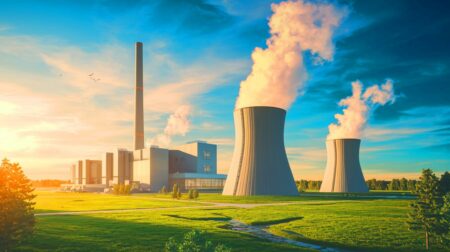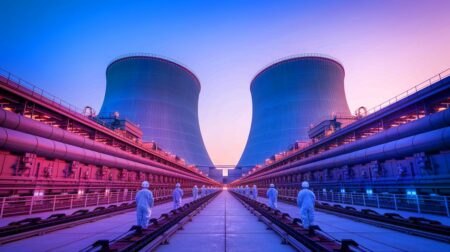When he witnessed a nuclear weapon detonating for the first time in history on July 16 in 1945, famed nuclear scientist Robert Oppenheimer felt the need to wax lyrical. “Now I am become Death, the destroyer of worlds,” he declared, quoting from ancient Hindu scriptures.
This stark view of nuclear fusion as a source of earth-shattering destructive power has persisted in the popular imagination ever since. Understandably so. Nuclear power can be destructive, even when it is used for peaceful commercial purposes such as generating nuclear power. The Chernobyl and Fukushima disasters were examples of that.
But nuclear power can also be a safe and reliable source of clean energy, experts stressed at the World Nuclear Exhibition, which ran from June 26 to 28 in Paris. Several countries like Germany that could previously relied on nuclear power are largely shunning it for ideological reasons, it was argued.
“Energy is a long-term business,” Tom Greatrex, chief executive of the Nuclear Industry Association in the UK and former shadow minister for energy, explained at the World Nuclear Exhibition, which ran from June 26 to 28 in Paris. “You take decisions that have very very long-term implications and that have a long-leading period. Politics is not. Politics is increasingly short term,” Greatrex added. “You’d want there to be decisions taken on a rational, logical basis but politics is neither rational no logical. It follows emotion and it follows quite often very shrill short-term demands.”
Some decision makers may shun nuclear energy for the wrong reasons. One such reason is their overestimation of the extent of the popular opposition to nuclear energy, Greatrex explained.
“In the UK context, if you ask people which electricity generation they prefer, renewables come on top a long way and then comes nuclear,” Greatrex said. “If you ask people in communities where there are proposals to build new nuclear facilities, then nuclear comes above renewables. And that’s because those communities are in places that already have a nuclear footprint, so they know the reality of living there as opposed to some of the fears that have been suggested by people who don’t know.”
Today’s Generation III and soon-to-launch Generation IV reactors are far safer and more efficient than earlier generations of reactors. And the vast majority of earlier reactors themselves have operated safely and without incidents for over a half century.

Industrialized economies and modern lifestyles alike require a steady supply of plentiful energy. Coal and other fossil fuels can provide it but are highly pollutive sources of energy. Renewables like solar and wind are low-carbon options, though their weather-dependency often requires complementary power sources in most countries. In many cases, that is nuclear power.
“When we are 9 billion people in this world in 2050, we will need to bring safe, clean and competitive energy to everybody – and I would say low carbon energy because probably, if not the biggest issue we have to face, is global warming,” Xavier Ursat, senior executive vice president of The EDF Group, said at the expo.
The large-scale adoption of nuclear power can also help countries reduce their carbon emissions significantly, noted Shunichi Miyanaga, president and CEO of Mitsubishi Heavy Industries in Japan. “Actually, many countries with strong decarbonization objectives [by help of] nuclear power and renewables, such as the UK and China, have already succeeded in reducing their carbon dioxide emissions, whereas countries that have failed to promote nuclear, such as Japan and Germany, have failed to reduce their carbon dioxide emissions,” Miyanaga pointed out.
Ultimately, responsibility lies with the industry, the experts argued, to alleviate public concerns about nuclear energy. If transparency is increased and safety standards are more adequately explained, politicians may be in a better position to take more informed long-term energy decisions.
Did you like it? 4.5/5 (29)








